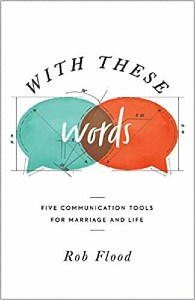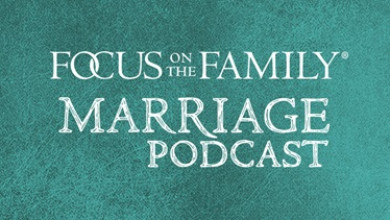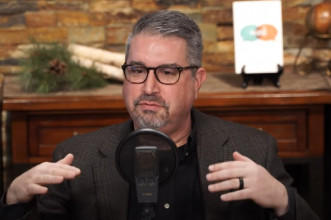
The War of Words
In this Adventures in Odyssey drama, a carelessly uttered word from Eugene creates havoc as it becomes the fashionable insult, resulting in a lesson about the power of words.
Home » Episodes » Focus on the Family Broadcast » Better Ways to Communicate With Your Spouse
Preview:
Gina Flood: When we come to a conversation with someone, we’re not just bringing our words, we’re not just bringing our tone, we’re bringing that inner narrative with us. So if we are telling ourselves lies, if I’m saying to myself, you know, I’m struggling with I- I’m a lazy wife, I’m not doing this, or he thinks I’m a lazy wife, all of that is gonna come into the conversation as well. And it’s on us to make sure that we’re believing truth.
End of Preview
John Fuller: That’s Gina Flood, describing how easily a husband and wife can slip into conflict, even in the most loving of marriages. You’ll hear more from Gina and her husband, Pastor Rob Flood, on today’s episode of Focus on the Family. Thanks for joining us. I’m John Fuller, and your host is Focus president and author, Jim Daly.
Jim Daly: John, let’s be honest. Uh, communication is difficult. There’s a banner for marriage.
John: (laughs)
Jim: Have you ever had that experience?
John: Mm.
Jim: You say, “Honey, that is not what I was saying.” (laughter). Put your hand up if that’s you.
John: We’ve been married a long time. That’s why I put that little qualifier.
Jim: Exactly.
John: We can’t guarantee it’s gonna be perfect, but we can help.
Jim: I know. And how many times has that happened? And on, you know, both sides. Both spouses usually will have that where they’re misunderstood. And it’s so important that you get through that moment as quickly as possible. Right? Uh, so it doesn’t last for a season. But sometimes, it does. You’re just not communicating the way you want to. And if that’s what you’re experiencing, this program today is gonna be for you. And I’m excited to talk about how to tune up that marriage communication today.
John: Yeah. We have, uh, as I said, Rob and Gina Flood with us. Rob is a pastor, and, uh, he’s in charge of community and care at Covenant Fellowship Church in Pennsylvania. And he and Gina have been married over 25 years. They have six kids, and Rob has written a book called With These Words: Five Communication Tools for Marriage and For Life. And, of course, we have that here at focusonthefamily.com/broadcast.
Jim: Rob and Gina, welcome to Focus on the Family.
Rob Flood: Ah, that’s for having us.
Jim: It’s good to have you. I love the opening question here about day six of your honeymoon.
Rob: (laughs)
Jim: You had some kind of, like, blowup.
Gina: (laughs)
Jim: And so many people have something like that, but honeymoons tend to bring out both the best and the worst in us. What was your day six like?
Rob: Yeah. So we had a, we had a wonderful engagement. It was a very long engagement.
Gina: It was a too long engagement.
Rob: It was a too long engagement.
Jim: Well, give me an idea. How long?
Rob: Uh, 19 months.
Jim: That’s not bad.
Rob: We were engaged. Uh, it was probably 12 months too long. Um, but we used that time to get ready, and we worked through sticky stuff in the engagement, but when it came time to the wedding, we thought we had worked through any challenges. We thought we had worked through any of the communication struggles we were having. And there was an area of sin in our lives and our relationship prior to our wedding that, uh, we had confessed to one another, confessed to God, co- and come clean with friends. And then, uh, we got married expecting happily ever after to begin. Uh, we went to the happiest place on earth, uh, for our honeymoon. We went to Disney World. And, uh, and it was actually there on day six that we got into a conflict. It started very small.
Jim: Wait a second. At Disney World, you got into conflict?
Rob: We did. In a beautiful hotel.
Jim: (laughs)
Rob: Uh, as we were getting ready for a beautiful dinner o- on that, that Thursday-
Gina: On Thanksgiving.
Rob: – no, Thanksgiving. It was actually on Thanksgiving.
Gina: I don’t remember any of it.
Jim: You don’t remember any of it?
Gina: No.
Jim: This is, this is a good thing.
Gina: I remember there was a conflict, but I could- I can- he tells me what it’s about. I don’t remember.
Jim: Well, there’s about a million people right now going-
Rob: Yeah.
Jim: Tell us what it was. (laughter)
Rob: So the, the area of sin prior to our marriage was in physical intimacy, and now that it was sanctified, and it was allowed, I think we just assumed as young people that it- all of that baggage would go away. And when-
Jim: Huh.
Rob: – and it did not.
Jim: Hm.
Rob: And so as we were working through those challenges, uh, it became very tense. So we stepped back from what we started to talk, and we didn’t talk well about it. Uh, we talked in a- accusations about it. That blew up, probably about 45 minutes of a l- maybe the loudest argument we’ve ever had.
Jim: Day six?
Gina: I have no idea-
Rob: Day six, and w- we’re about 25 1/2 years in at this point.
Jim: Yeah.
Rob: And that was the worst argument we had. It ended with her leaving the hotel room. I went to sleep.
Jim: ‘Cause you were distraught? That doesn’t sound like a normal thing that- a person under stress might do.
Rob: We- he- it wa- it was- It was an area, uh, actually the first couple of our marriage, conflict, the stress of conflict in our marriage, I processed by getting very fatigued.
Jim: Oh, interesting.
Rob: And did not press into more communication. I hadn’t learned that about myself on day six yet, uh, that that was a pattern. And so, uh, we had, we went to dinner that night, uh, during a truce. Had a fine dinner, but when we came back, things were just not the same. We didn’t have the same level of trust for one another. We didn’t have the same level of comfort. Just interpersonal intimacy was really awkward.
Gina: I think it’s, it’s worth noting just as an aside, I think there is a myth out there that when you get married, that intimacy should be easy and fine because now you’re married. And I think that a lot of new couples can be really discouraged because it’s not. It- sometimes it is, but sometimes it’s not. And so, I think it’s, it’s a good myth to kind of quash and let known that you, you can talk to somebody.
Jim: Let’s move, you know, you’ve done a great job of laying that groundwork and what conflict was there. But then you, uh, later… and I don’t know how much later. I wanna hear that. You began to think maybe I married the wrong person. Was that both of you, or just one of you?
Gina: That might have been day six?
Jim: What’s that?
Gina: That might have been day six.
Rob: That was day six.
Gina: (laughs)
Jim: That, that thought entered your mind. And then how did you process that? And how did you… obviously, you’ve been married 25 years now, so you found your way through that doubt.
Rob: Mm-hmm. We did.
Jim: But d- explain that, that process.
Rob: Yeah. That first year, I would say, we went through quite a bit of second guessing, distancing from one another. We lived together. We were f- we func- the house functioned, but we didn’t really function relationally. Uh, about 15 months later is when we started to put this back together. But it was in one of those conversations that we discovered, right about the nine-month mark of our marriage, we each had begun in our own way, privately praying that the Lord would either take me, or the Lord would take her. Because, we, we had this strange, Christian conviction that divorce wasn’t permissible. That’s not the strange, Christian conviction. But since divorce wasn’t permissible, the only way out of this was for one of us to die. And we were praying that before our first anniversary. And so, fif- now we’re 15 months in, and we’re confessing these things to one another.
Gina: I think it’s worth noting that in this time, we were, we were functioning in the church. We each had ministries that we were either leading or participating in, small groups we were participating in, and you know-
Jim: Right.
Gina: – people would say, “How are the newlyweds?” And nobody really wants to hear, “We’re so bad. We’re in such bad shape.”
Jim: Mm.
Gina: They, you know, the traditional response would be, “It’s great. It’s wonderful. It’s everything I’ve dreamed.” And so, we would answer affirmatively, but inside it, it wasn’t.
Jim: Yeah.
Gina: And I think, again, I think there are a lot of new couples who find themselves in a similar situation.
Jim: Well, and if you could role that tape back with the wisdom that you have today, what would you say to that first year, newlywed couple where it’s not great? Should they say to somebody they can trust, “You know what? It’s not good. We’re in trouble.”
Gina: Yeah. I, I would say that. I would say, you need to do it in community. You need to live that out in community, particularly, I would think, that an older couple who’s further ahead of you would be really beneficial in that, because they have worked through seasons of trial and difficulty, and seasons where they were further apart than together.
Jim: I’m gonna a- I don’t wanna jump ahead, but did that happen for you? Did you find a couple who was willing to stand with you, or that somebody you could trust? Or did you have to kind of, you know, trunch this on your own? Kind of the marriage jungle, if I could call it that?
Rob: In the rebuilding process, what we discovered were some ministries that are, that intentionally build marriages. And they, they… in fact, uh, they taught us truths that we first started to apply to one another. Well, this is what the Bible says you should be doing. This is what the Bible says you should be doing.
Jim: (laughs) How’d that go?
Rob: Well, it went-
Jim: (laughs)
Rob: -it kept, it kept things in a very bad place. (laughter)
Gina: That’s so true.
Jim: I was gonna say. (laughs) Whoa.
Rob: Months later, we started to take those same truths and apply them to ourselves.
Jim: Right.
Rob: And that’s when we started to see the grace pour into the relationship. That’s when we saw one confession lead to forgiveness for 10 different things. And God just put a wind to our back.
Jim: Mm.
Rob: And as he was putting us back together, he simultaneously gave us a desire to be used of God to help marriages avoid, or at least work through, the very thing we had to walk through.
Jim: You know, it’s interesting there, what hopped into my mind when you said that was, it’s not truth that’s nullified. It- truth is active. It’s your misappropriation of the truth.
Rob: That’s right.
Gina: Yeah.
Rob: Mm-hmm.
Jim: That’s a pretty powerful statement.
Rob: Yes.
Jim: You know, applied to yourself, that seems scriptural, right?
Rob: Mm-hmm.
Jim: Look at your own heart before you look at your spouse’s heart.
Gina: We say, go into our marriage with a rake, where you’re raking in God’s truth, rather than a shovel. You’re shoveling-
Jim: Interesting.
Rob: Mm-hmm.
Gina: – the truth onto your spouse.
Jim: Yeah. And that’s a good way to envision that. You also mentioned something called, you called, the foolish marriage.
Rob: Yes.
Jim: Um, and how people, uh, need to recognize, I guess, what the definition of a foolish marriage is. What is it?
Rob: Yeah, well f- the, the chap- that chapter flows out of Proverbs 18 where there’s all of these characteristics of a fool. And after 12 years of marriage counseling, you start to see these patterns, uh, develop in the couples that you care for. And we saw it in our own relationship as well. The, this is where the fool is, is contentious. He’s looking for an argument. He doesn’t look how to overcome, or to overlook an offense. He looks how to take one up. And if we can help couples, whether it’s a husband or a wife, sometimes it’s both. If we can help them just realize, their responses to their spouse are what really throws the gasoline on the fire.
Jim: Oh, yeah.
Rob: That i- if they would just respond with a gentle word, right? Proverbs 15:1. If they would respond without looking for a fight, then what you’d have is a sin that fell to the ground. And it’s not an offense that got picked up. And you have peace in the home, and the Gospel continues to reign in the relationship.
Jim: Rob, y- you have a knife analogy I want to make sure we get to that. W- What was the knife analogy, and what can we learn from that?
Rob: So, one of the things that’s very important to realize is when, uh, when, if your wife, or your spouse, ends up sinning against you, that can land on you as a wound. Right? And nothing you’re gonna do is gonna undo that. What we need to be conscious of is, is we don’t take a knife and, and then hurt our spouse back. What that ends up doing is, she cuts me the first time with her comment. If I cut back, that only adds another wound to the marriage. It adds, it adds another thing that has to be forgiven, another thing that has to be healed. So now, because of my retaliation… it’s not a response, it’s really a retaliation. We’ve now got two things we’ve gotta deal with. We h- we’re, we’re further damaged. And so, it’s important as someone who’s being sinned against that we realize, okay. I’ve not just been sinned against. The marriage has been. Let me not further damage this-
Jim: Mm-hmm.
Rob: – by adding another sin, or another offense to the problem.
John: Well, I appreciate the heart and wisdom, and the vulnerability as well of our guests, uh, on Focus on the Family. We have Pastor Rob and Gina Flood with us, and Rob has written a book, With These Words: Five Communication Tools for Marriage and Life. And we’ll encourage you to get your copy by calling 800-A-FAMILY or stopping by focusonthefamily.com/broadcast.
Jim: L- let me pick up on this same theme because, you guys really experienced this where one of you was saying something that was misunderstood, and it… describe an example or two of how that impacted your relationship. Gina?
Gina: It can still happen. (laughter)
Rob: No. It still happens?
John: You wrote the book and it still happens.
Jim: ‘Cause it’s true. I- it’s, there’s no perfection on this side of heaven, right?
Gina: Right.
Jim: So we’re gonna stumble. Hopefully we have longer periods of time where we can run the good race.
Gina: That’s right.
Jim: But somewhere along the line we do trip a little.
Gina: I think the tools that are in Rob’s book are excellent. They’re tools that we use a- in our communication regularly. The tools that we’ve either heard about along the way, read about along the way, developed. And those tools, I think, are really the foundation.
Jim: They really are. One is mirroring. What we’re getting at, Rob, when you talked about mirroring.
Rob: So, this is wonderful. Let me give an example from that first year of our marriage, and how mirroring would have helped. We had a disposition of judging one another. We were not being gracious. There was not charity we were giving to one another. And so if she would say to me, very innocently, if she were to say, “Hey, Rob, have you taken the trash out?” What I’m hearing is, you think I’m lazy and negligent. Okay?
Gina: You can see, that’s gonna go well.
Jim: Right. I love the reminder. (laughter) So-
Rob: If I said to her, “Hey, what time is dinner?” She’s thinking, oh he doesn’t think I’m gonna cook for him tonight. There, there was this, this judgment we’re adding-
Jim: Oh.
Rob: – but not voicing, right? So the tool of mirroring there, for a couple that’s looking to work through some of these misunderstanding. She says, “Have you taken the trash out?” The best response is for me to say, “Oh, no, I haven’t. Thanks for the reminder.” But if I’m in a bad place, and I’m, I’m offended by that otherwise innocent comment, if I want our marriage to press towards Godliness, I need to respond by saying, you know, “Hey, Sweetheart, did you mean to judge me as lazy? What did you mean when you said that? Were you just asking me to take the trash out?” That kind of clarifying question that, uh, mirrors back to her what it is that I heard her say. And now she gets to say, “Oh, no, no, no, no. That’s not what I meant at all.” And in the tool, in the chapter on that tool of mirroring, one of the most important pieces of this tool is that, the person who originally made the statement, in this case it would be Gina, she gets to decide what she meant, and didn’t mean.
Jim: Right.
Rob: Right? So she says, you know, “Did you take out the trash?” When you say that, Gina, are you, are you meaning to judge me?” “No, no, I’m not.”. “Well, yes you are.” Well now, I’ve just obliterated the tool because I’m committed to conflict. I’m the fool in that moment, committed to conflict. But she gets to decide what she meant. If I say something, if we’re talking through a significant parenting conversation and I, I suggest that we don’t discipline this way, but this way. She could think, well he doesn’t wanna discip- he doesn’t wanna punish the kid. All she has to say is, “So here’s what I’m hearing you say.” And now I get to say, Yes, that’s what I’m saying.” We get to move forward without misunderstanding. Or, “No, no, no. That’s not what I meant.” I get to decide what I meant, and then I clarify and we move on. That’s when the tool of mirroring really helps.
Jim: Yeah. I know that. And it’s really good. I like that. And every couple at every stage of their marriage can employ that. The earlier you do it in, in your marriage, the better off-
Rob: Yes.
Jim: – you’re gonna be.
Gina: As you’re describing this, something that pops into my mind is, when we come to a conversation with someone we’re not just bringing our words, we’re not just bringing our tone, we’re bringing that inner narrative with us. So if we are telling ourselves lies, if I’m saying to myself, you know, I’m struggling with I- I’m a lazy wife, I’m not doing this, or he thinks I’m a lazy wife, all of that is gonna come into the conversation as well. And so it’s on us to make sure that we’re believing truth.
Rob: Mm-hmm.
Jim: Absolutely. I- let me, uh, touch on something you also mentioned in you book, With These Words. And that is the, “The different behavior we tend to express between work and home.” I mean, work, we’re very polite. I mean, I can get… I understand that. I mean, even back when I worked with International Paper. I mean, you’re, you’re always treating people with deference, you know? “Did you happen to get that order in correctly that I need by next week?” (laughs)
Rob: Right.
Jim: But at home, we can put on a different attitude which is, “Where’s that thing we talked about getting? I thought you were picking that up. How come you didn’t take that dry cleaning in?” Or, you know, whatever it might be. But there seems to be less generosity, I guess is the right way to say it. Why wouldn’t we reverse that, or not reverse it necessarily, but be kind to all? That’s what the scripture calls us to do.
Rob: One of- well, that’s a good question. Why? The reasons could vary. One of the, the primary reasons that I’ve, I’ve discovered is, people feel the consequences of being ungenerous at work immediately. Y- th- you’re concerned the consequences would bear-
Jim: Right.
Rob: – would bring a bad result in your life. And at home, the consequences often happen gradually.
Jim: Mm.
Rob: And so we give ourselves all of this slack at home, where we don’t when we’re talking with church members, or in our small groups, or at work. Um, there is a… and w- w- the dichotomy that, that this shows is not just intended to, to make the person feel bad. Well look, you’re duplicitous. That’s not what we’re, we’re after. What I’m after in pointing it out is that you really can do this. You can be gracious if you’re spoken to harshly. You do it at work all the time. You can ask a clarifying question to make sure you get what’s being said so your work reflects the, the directions you’re being given. These are skills and tools that you can do. So now let’s do it in the most important relationship in your life.
Jim: Yeah, and that’s so good to remember. You should never treat your spouse worse than you would treat somebody at work.
Rob: Absolutely.
Jim: I mean, that, I mean, it sounds simple.
Rob: Mm-hmm.
Jim: You should be treating them far better.
Rob: That’s right.
Gina: Yes.
Jim: I mean, that’s the point. I mean, this is your cherished spouse.
Rob: Mm-hmm.
Jim: And it’s a good reminder in that regard. Uh, my wife and I can relate to something you also mention in the book, and that is the night owl, the morning person.
Rob: Mm-hmm.
Jim: Gina, I think you’re the morning person.
Rob: I am.
Jim: Which I am as well. And Jean’s the night owl. And-
Rob: That’s me.
Jim: – Rob, that’s you.
Rob: That’s me.
Jim: So, uh, i- i- one of the pictures I could paint here is, you know, it’s 10, 11:00 at night. I’m ready to go to bed. I can’t even put two words together. And I lay down and Jean says, “Can we talk for a minute?”
Rob: (laughs)
Jim: And I’m like, w- w- what?
Gina: It’s never goin’ anywhere but down the toilet. (laughter)
Jim: I mean, “Are you listening to me? I can’t believe you fell asleep last night when I was tellin’ you about my girlfriend.” (laughs) But Gina, you’ve experienced that, right?
Gina: Yes. Yes, we have. We discovered pretty early on that if there was going to be any kind of serious conversation that it needed to happen before 10 p.m.
Jim: Yeah. That’s a good rule.
Gina: There was this one night when we were in bed, and he (laughs) we’re, we’re in bed, the lights are out. He’s, like, starting to unburden to me something he’s struggling with. A real struggle. Something that we would typically have a conversation with. Now, we had been married several years at this point. We had worked through a lot of the rough spots, so that should be said. But I (laughs) had nothing left. So I was like, “Honey, do you want me to draw you out, or can I just tell you what your sin is?”
Jim: (laughs) ‘Cause I’m really tired.
Rob: That’s right.
Jim: Let’s finish this. Cut to the chase.
Rob: She wanted to be helpful. I knew it was, like, 11:30, right? And so, b- it’s burdening me. Just tell me my sin, G. Just tell me. I I need your insight. Um, but that’s n- I wouldn’t start relationships there.
Gina: No.
Rob: Uh, you wanna build to a place of confidence and trust.
Jim: Sure. Of course. This is the comedy of it.
Rob: That’s right.
Jim: And then knowing each other well enough to know when to pop this big point and, you know, want some feedback. That’s, that’s really knowing your spouse well enough to know when will get the highest response rate possible?
Rob: Right. And that’s part of the tool of proper timing. Here it’s just knowing one another. Sometimes it’s reading the person who’s had a really, hard day. And, you know what? This can wait ’til tomorrow, or this can wait ’til the weekend so that I get him or her at their best. Uh, just applying that tool of proper timing really avoids so many unnecessary places of conflict.
Gina: Right. And you’ve just, you’ve established healthy communication habits so it can be done expediently.
Rob: Right.
Jim: Right.
Gina: And you, you can kind of go past all of the, um, the guardrails that you’ve put up to make sure that the communication goes well and you can just, you can just get to it. But you’re on the same page.
Rob: Right.
Jim: Yeah. Right at the end here, Rob and Gina, I wanna ask both of you, uh, to s- kind of circle back to those early years and those difficulties. Uh, prayer, which I said probably is the most important. But a s- close second would be forgiveness.
Gina: Yes.
Jim: And I can only imagine many people listening right now, if they’re in the, um, you know, the pit of despair with their marriage. They’re not communicating well. They’re kind of where you were on day six. There’s gonna be some people listening right now who are in that spot. They’re thinking, “I married the wrong person.” Everything you both thought about 25 years ago.
Rob: Mm-hmm.
Jim: Um, how do you apply forgiveness effectively rather than superficially, if I could say it that way. And to be honest, I’ve done it both ways where I, you know, you’re forgiven, John. That’s okay. Fine. But I haven’t really done it. There’s something bubbling still, but I don’t wanna deal with it. And in marriage, that can happen frequently. Let’s just get past it. You’re not really forgiving. And then there’s true forgiveness where, “Honey, uh, I, I didn’t, you know, I didn’t take that offensively.” So speak to that dynamic and really that specific person listening right now who’s dying in their marriage.
Rob: Mm.
Gina: If you have t- the time to do it, the best way to go about it is to deal with your own sin first.
Rob: Mm-hmm.
Gina: Because if you can come to a place where you realize that I will never need to forgive my spouse more than what I have been forgiven in Christ. Then you can come to a place where you can extend forgiveness and be genuine about it.
Jim: Gina, let me push you a little on that. That wife that is saying, “You don’t know my husband. He’s probably far worse than Rob was, ever.” And, and again, I’m just trying to tease out that person listening that has that hard heart to even say that. It may even be true.
Gina: Yeah.
Jim: But you have to, um, grapple with that and understand that, like you said, Jesus has died for each one of us.
Gina: Yeah. He has. And I, and you may be in a worse place than we were, and your husband may be much worse than we are. And you may be in a place where you may be in danger and you need to seek shelter and safety before you can do any of these things.
Jim: Yeah.
Gina: Um, but I want to encourage women who might be in a position like that to, to not give up hope. You have a God who has created the universe, who is holding everything together for Him and by Him. Your body is being held together by His will. He can do a work in you. We, you know, we don’t even have to be willing. He says in his word, we just have to want to be willing.
John: Wow.
Gina: And then He will work. See, you don’t even have to get yourself to a place of willingness. You just have to get yourself to a place of, I want to be willing, Lord, to see where my sin is in this situation. I want to be willing to forgive my husband of all of these things that feel so unforgivable and unsurmountable. I want to be willing, Lord. And you lay that out before the Lord, and that is like a feast.
Jim: Yeah.
Gina: And he can do so much with that.
Jim: I so appreciate that. And, of course, the shoe can be on the other foot. We’ve talked about the wounded wife, but you know, husbands can have their wounds as well. And I wanna make sure we recognize that. But Rob and Gina, what a great discussion. I’m so glad… you know, when you think about it, your desire to stay committed. The fact that divorce was never an option for you. I so appreciate that. And now, 25 years later, you know, your marriage is in a much better place. And that’s one of the things I was talkin’ to Jean just yesterday, uh, about couples that I know that have given up so early because they hit a valley and didn’t have the capacity to get through that valley and, uh, to see the next mountain top. And there are gonna be those kind of vacillating mountain top experiences and valley experiences in marriage. And for young, married couples I’d say, “Hang in there. Do not give up.” Because i- the longer you stay together in a Christ oriented relationship, the deeper it goes, the better it gets.
Gina: Yes.
Jim: And it’s hard to see that when you’re in that difficult spot.
Gina: Yes.
Rob: Yes, it is.
Jim: But it’s true. And you guys have done a great job expressing that today. Let me say to the listeners. If you’re in that position and you’re really wanting to do the deeper gardening of your relationship, your marriage, get the weeds up. Uh, I just used all the metaphors. This is a great book, With These Words. I- it’s not complex. It just helps you to understand communication and the idea that you need to avoid that responsive nature that’s in our flesh, and be more Christ-like in how you respond to your wife or your husband. Pretty simple, but hard to do.
John: Yeah. Uh, get in touch and get a copy of this book, With These Words: Five Communication Tools for Marriage and Life. And when you’re online or have us on the phone, ask about our free, marriage assessment. It will help you see some strengths and maybe an area or two to grow in. Uh, that’s immediate, and you can access that online. Our website is focusonthefamily.com/broadcast or call 800 the letter A and the word FAMILY.
Jim: And also, let me just mention as we often do, uh, if you can send a gift of any amount to Focus on the Family to be part of the ministry, we’ll send you a copy of Rob’s great book, With These Words, as our way of saying thank you for partnering with us at Focus on the Family. If you can’t afford it, we’re gonna trust others will cover the cost of that. It’s such a good, basic, marriage tool-
John: Mm-hmm.
Jim: – that we wanna get it into your hands. So let us know either way. Uh, become a partner with Focus a- and we’ll send you the book to say thank you. If you can’t afford it, we’ll trust others will get it. We’ll trust others will provide for you.
John: And our number again, 800 the letter A and the word FAMILY.
Jim: Rob and Gina, thanks for being with us.
Rob: Thank you for the conversation, and thanks so much for havin’ us.
Gina: It’s been a privilege. So great to be here. Thank you.
John: Well, we sure hope you have a great weekend with your family and your church family as well. And then, join us on Monday for encouragement from Jill Savage about the empty nest years.
Preview:
Jill Savage: Oftentimes people have been waiting for the kids to leave so long that they’ve forgotten that maybe it actually could be different.

Rob Flood serves as Community and Care Pastor at Covenant Fellowship Church in Glen Mills, Pa., where his responsibilities include marriage ministry and counseling. He is also the author of a book titled With These Words: Five Communication Tools for Marriage and Life. Rob and his wife, Gina, have been married since 1995 and have six children.

Receive Rob Flood's book With These Words for your donation of any amount!

The Focus Marriage Podcast features relatable advice on having a healthy marriage, with stories from guest speakers that challenge and encourage every couple to build a deeper connection.

Visit our YouTube channel to watch a brief video in which Rob Flood explains how physical touch can decrease the tension in the midst of a difficult conversation with your spouse.

Visit our online store and purchase a CD of today's program for yourself or to share with a friend.

The Focus on the Family Marriage Assessment is designed to evaluate the strength of 12 essential traits of your marriage. Do you know your marriage's strengths and weaknesses?

The words we use can be a key factor in building trust. Recognize their power for change, and they become powerful tools in your relationship.

It takes intentionality to overcome the tendency for talk with your spouse to morph from meaningful to administrative. Deep, meaningful conversation is a must for couples hoping to stay connected.

Just as a checkbook reveals how we prioritize the use of our money, our schedules reveal how we prioritize the use of our time. And when time spent does not reflect priorities valued, we know we are presuming upon something.

Pride has no place in wedded life. In other words, if you've allowed pride to come in the front door, then get tough with it and kick it out the back door.

A biblical tool called "emotional word pictures" can help you improve your communication skills with your spouse. Learn to use this emotional language of love that Jesus modeled for us.

Dr. David Clarke offers couples advice for breaking down common communication barriers in a discussion based on his book Men are Clams, Women are Crowbars: The Do's and Don't's of Getting Your Man to Open Up.

Be intentional about sharing your unspoken hopes and desires with your spouse.

In this Adventures in Odyssey drama, a carelessly uttered word from Eugene creates havoc as it becomes the fashionable insult, resulting in a lesson about the power of words.

This discussion offers a preview of Volume #16 “Cultures in Conflict” from the That The World May Know video series, available below.

Debra Fileta will help couples better understand the four seasons of healthy relationships, what to expect during each one, and how to carefully navigate them for a stronger marriage. (Part 1 of 2)

Larnelle Harris shares stories about how God redeemed the dysfunctional past of his parents, the many African-American teachers who sacrificed their time and energy to give young men like himself a better future, and how his faithfulness to godly principles gave him greater opportunities and career success than anything else.

Amy Carroll shares how her perfectionism led to her being discontent in her marriage for over a decade, how she learned to find value in who Christ is, not in what she does, and practical ways everyone can accept the messiness of marriage and of life.

Pastor Dave Carder offers couples practical advice for protecting their marriages from adultery in a discussion based on his book Anatomy of an Affair: How Affairs, Attractions, and Addictions Develop, and How to Guard Your Marriage Against Them. (Part 1 of 2)